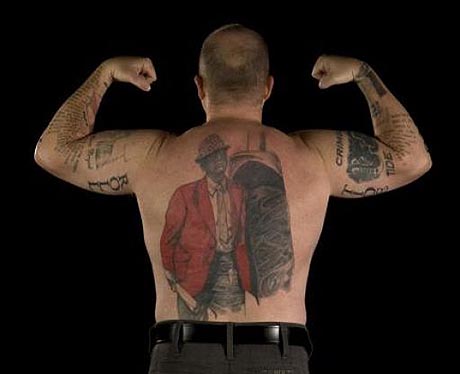Meet Nate Davis. He’s such a devoted fan of the University of Alabama’s football team that he’s covered roughly 70 percent of his upper body (so far) with tattoos attesting to his love of a school and a football team. Because of his fanaticism, he’s made himself a laughingstock to many people who consider him crazy or weird. But he doesn’t care, because he ultimately seems more dedicated to Alabama football than anything else in life.
I started thinking about Davis Friday evening because of an 8-minute ESPN film I’d seen earlier in the day. The short film deals with people around the country who have taken their love of various sports teams to the graves. They’ve been buried in team jerseys and caskets bearing the logos of the teams they cheered for. One man even had his funeral with his body propped up in a recliner, with a television showing Pittsburgh Steelers football games. (You can watch the short film at the end of this article.)
Are these people crazy?
My first instinct is to call them crazy, but I suspect there’s a bit more going on than that. I believe we all need purpose and some subject upon which to focus our energies. Without that, we become bored, lethargic and rudderless. When people become this kind of “super fan,” it merely means that they filled an empty spot in their lives — one that was devoid of purpose — with an obsession for a team.
Why that sport? Why that team? I’m not sure it matters why. When there’s an empty spot in a life, I suspect the first thing rushes in that makes itself seem socially acceptable at the moment — because we crave something to identify with and something to devote ourselves to.
For others, it might be music or gaming or books or partying or a thousand other things. But whatever thing takes that central focus in your life becomes your purpose and passion. You might become a sports super fan. You might become the ultimate Xbox nerd. You might become an expert on Star Trek trivia.
Or you could do something that actually matters — something that could fill your need for purpose and also make the world a better place.
What I’d like to suggest is that the things that people get attached to are frequently interchangeable. And I’d like to suggest that we would be happier with our lives if we found something worthwhile to latch onto.
If you’re going to be obsessed with something — at least enough to make it a driving purpose in your life — wouldn’t it be better to be purposeful in choosing it? Instead of letting yourself get obsessed about football games or baseball games, wouldn’t it be better to find your meaning in something more in keeping with your higher values?
If you’re a Christian, for instance, that might be ministry through your church or another organization. It might even be moving into a full-time ministry role. It might just be getting seriously involved with a homeless shelter or a prison ministry. There are dozens of things you could choose from. But wouldn’t it be better to be intentional in your selection — rather than just taking whatever drifted into your life and became a habit?
 Something is going to become a religion in your life. It might be work. It might be a sports team. It might be alcohol or drugs. It might be gambling. It might be loving and protecting your wife and children. It might be serving others.
Something is going to become a religion in your life. It might be work. It might be a sports team. It might be alcohol or drugs. It might be gambling. It might be loving and protecting your wife and children. It might be serving others.
Since you need a purpose, isn’t it better to pick one intentionally? If you just take whatever shows up in your life, you might wake up one day and realize you’ve become the local version of Nate Davis.
When you go to your grave, wouldn’t you like to have something more important to take with you than tattoos of a long-dead football coach or some team’s jerseys? I enjoy some sports, so I don’t object to enjoying them. In fact, I’m a Crimson Tide football fan, just as Davis is, but it’s just a game, not an obsession, to me.
Choose your purpose and make it your obsession if you want to, but choose wisely. We only get to experience this life once. Make it worth it. When you die, take something worth living for to your grave with you.

 FRIDAY FUNNIES
FRIDAY FUNNIES A year after first seeing doctor about cancer, how much have I learned?
A year after first seeing doctor about cancer, how much have I learned? On National Dog Day, remember how love can change any of us
On National Dog Day, remember how love can change any of us